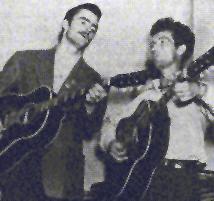TALKING SAILOR (aka TALKING MERCHANT MARINE)
(WOODY GUTHRIE) (1944)

CISCO HOUSTON & WOODY GUTHRIE (c. 1944)




To order available recordings right from this site:
CDnow's Country/Folk section!

Outside of the Almanac Singers sessions, Guthrie did not make any commercial recordings for nearly three years after resettling in New York. During much of that time he was not available; Guthrie spent most of 1943 in the Merchant Marines, sailing with Cisco Houston on board the William B. Travis.
"Talking Sailor" recalls his experiences on board the Travis.Ronald D. Cohen & Dave Samuelson, liner notes for "Songs for Political Action," Bear Family Records BCD 15720 JL, 1996, p. 114.

Most of the crew joined us to watch the sky and listen to Woody sing the song he'd been writing since we left home. He called it "Talking Merchant Marine." He sang it as a talking blues...."Hot damn, Woody, that's pretty good!" one of the gun-crew kids sang out. "Did you really write that?"
"Yup."
"Did you write any others?"
"Yup."
"How many?"
"Oh, not countin' the ones I lost or threw away, 'bout a thousand."
"A thousand? Godawmighty, Woody how can you even get the ideas for a thousand songs?"
"Easy. There are two kinds of songs -- living songs and dying songs. The dying songs -- the ones about champagne for two and putting on your top hat -- they tell you that there's nothing to be proud of in being a worker, but that someday if you're good and work hard, you'll get to be boss. Then you can wear white tie and tails and have songs made up about you. I like living songs that make you take pride in yourself and your work, songs that try to make things better for us, songs that protest all the things that need protesting against, and God knows there's thousands of them, and if you think of them you'll think of a title, which is half the battle in writing a song. There's the 'Single Girl Blues,' the 'Starving Family Blues,' 'Leaky Roof Blues,' 'Hock Shop Rag,' 'Pawn Shop Rag,' 'Pawn Shop Polka,' 'Down Payment Scream,' 'High Price Gallop,' 'The Dying Landlord,' 'The Dead Landlord' . . ." and Woody went on calling off song titles -- the men laughing at every one of them -- winding up with "Gone Woman Blues, Gone Man Blues," "Scabs in My Factory, Scabs in My Hair, Scabs in My Bed," "Shoo, Scab, Shoo," "Union Mattress, Union Baby," and "My World Union."
"Godamighty, Woody you must have made a million dollars!"
"No, but he could have," Cisco said.
"Maybe," Woody continued. "I once had my own radio program, but the sponsor — a big tobacco company — wanted me to sing dying songs, so I quit."
"Tell them about your resignation letter." Cisco nudged Woody.
"Oh, I just wrote 'Dear sirs, I've smoked your tobacco, I've chewed your tobacco, and I've even snuffed your tobacco, but I'll be goddamned if I'll have your tobacco shoved up my behind.'"
That night I read more about Woody's life. His pages almost made me forget the image of the keel and the torpedo.
Jim Longhi, Woody, Cisco & Me -- Seamen Three in the Merchant Marine, Urbana and Chicago: University of Illinois Press, 1997, pp. 57-59.



In bed with my woman, just singin' the blues,
Heard the radio tellin' the news:
That the big Red Army took a hundred towns,
And Allies droppin' them two-ton bombs.
Started hollerin', yellin', dancin' up and down like a bullfrog!Doorbell rung and in come a man,
I signed my name, I got a telegram.
Said, "If you wanna take a vacation trip,
Got a dish-washin' job on a Liberty ship."
Woman a-cryin', me a-flyin', out the door and down the line!'Bout two minutes I run ten blocks,
I come to my ship, down at the dock;
Walked up the plank, and I signed my name,
Blowed that whistle, was gone again!
Right on out and down the stream, ships as fur as my eye could see, woman a-waitin'.Ship loaded down with TNT
All out across the rollin' sea;
Stood on the deck, watched the fishes swim,
I'se a-prayin' them fish wasn't made out of tin.
Sharks, porpoises, jellybeans, rainbow trouts, mudcats, jugars, all over that water.This convoy's the biggest I ever did see,
Stretches all the way out across the sea;
And the ships blow the whistles and a-rang her bells,
Gonna blow them fascists all to hell!
Win some freedom, liberty, stuff like that.Walked to the tail, stood on the stern,
Lookin' at the big brass screw blade turn;
Listened to the sound of the engine pound,
Gained sixteen feet every time it went around.
Gettin' closer and closer, look out, you fascists.I'm just one of the merchant crew,
I belong to the union called the N. M. U.
I'm a union man from head to toe,
I'm U. S. A. and C. I. O.
Fightin' out here on the waters to win some freedom on the land.

